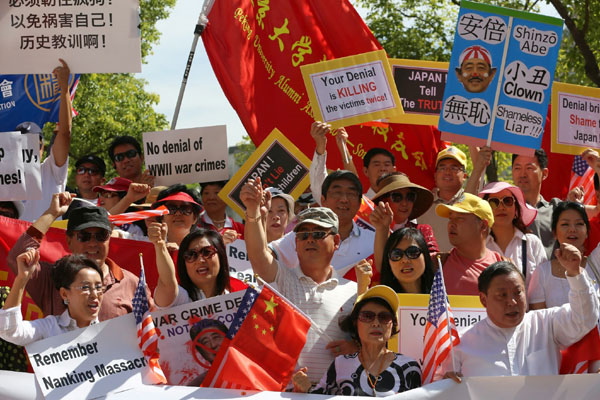Abe's irresponsible remarks in US trip draw domestic, international outcry
(Xinhua) Updated: 2015-05-04 14:43
BEIJING -- Japanese Prime Minister Shinzo Abe wrapped up his week-long visit to the United States on Sunday. However, his irresponsible remarks and the attitude of distorting history released during the trip have drawn widespread criticism.
Addressing the US Congress on Wednesday, Abe indicated that his country would no longer offer sincere apology for its aggression and atrocities during World War II, claiming that the postwar path Japan has been pursuing is based on "deep remorse" over the war and that Japan's "actions" brought "suffering to the peoples in Asian countries."
In such a way, the Japanese prime minister unveiled his historical revisionism ideology by using "actions" instead of "aggression and colonial rule," and "deep remorse" rather than "heartfelt apology," in an apparent effort to dilute the country's wartime atrocities.
In addition, without mentioning the comfort women victims, Abe just said in his speech that armed conflicts always made women suffer the most, seeking to justify the imperialist Japan's recruitment of sex slaves.
The CNN said in an article that Abe surprised nobody by "missing a great opportunity to dispel worries and tensions he raises with his revisionist views on history."
The "Abenesia" is harmful to Japan's international image, riles China and South Korea and thereby undermines the bilateral security agenda, it added.
Abe's speech was "less than rousing," said Britain's Financial Times in a commentary. "To American ears, Mr. Abe's words were those of a strong ally, regretful of its militaristic past on the eve of the 70th anniversary of the end of the war in the Pacific. But to Japan's Asian neighbors, Mr. Abe offered nothing new," it noted.
Due to his irresponsible remarks, Abe's visit has been accompanied by protests and calls for a formal apology for his country's war past.
Chinese, Koreans and local Americans demonstrated in Los Angeles, San Francisco, Washington, D.C. and other places against the visiting Japanese leader, shouting "Abe, Liar!" "Abe, Apology! " "No Cover up of War Crimes!"
South Korean President Park Geun-hye on Monday urged Abe to face up to its imperialistic history and apologize for wartime brutalities, citing his speech to the US Congress.







